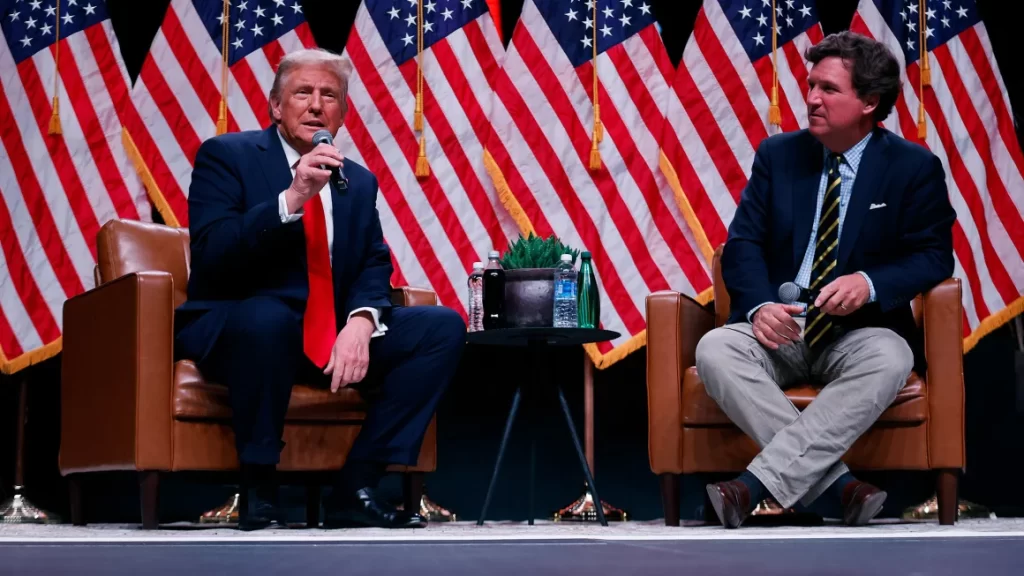During a recent campaign event in Glendale, Arizona, Donald Trump directed a wave of vitriol toward former Representative Liz Cheney, referring to her as a “war hawk” and suggesting extreme violence against her. Speaking alongside former Fox News host Tucker Carlson, Trump’s remarks marked a significant escalation in his combative rhetoric against critics within his own party.
“She’s a radical war hawk,” Trump exclaimed. “Let’s put her with a rifle standing there with nine barrels shooting at her, OK? Let’s see how she feels about it when the guns are trained on her face.” His comments drew sharp attention for their inflammatory nature, further illustrating his trend of employing violent imagery when discussing political opponents.
Cheney, once a prominent figure in the Republican Party as the third-ranking member of House leadership, has been one of Trump’s fiercest critics. She has been outspoken about his attempts to overturn the 2020 election results and his role in the January 6 Capitol insurrection. After leading a House committee investigating the attack, she was ousted from her seat in deep-red Wyoming in 2022, largely due to support for her by Trump-aligned challengers.
In his remarks, Trump called Cheney “very dumb,” a “stupid person,” and “the moron,” showcasing his disdain for her continued opposition. The former president’s suggestion that she should be shot represents a troubling escalation in political discourse, particularly as he campaigns ahead of upcoming elections, where he has worked to erode public confidence in the democratic process.
Cheney has recently aligned herself with Vice President Kamala Harris, encouraging Republicans to put aside party loyalties in order to reject candidates she views as threats to democracy. Trump expressed surprise at Dick Cheney’s endorsement of Harris, given his prior pardon of Scooter Libby, the former chief of staff who was convicted of perjury in 2007. “I don’t blame him for sticking with his daughter, but his daughter’s a very dumb individual — very dumb,” Trump added.
During his speech, Trump criticized Cheney’s hawkish stance, claiming that her warlike tendencies were rooted in a comfortable Washington lifestyle. “They’re all war hawks when they’re sitting in Washington in a nice building, saying… ‘Let’s send 10,000 troops right into the mouth of the enemy,’” he remarked.
This trend of violent language is not new for Trump. During his 2016 presidential campaign, he suggested that a heckler at one of his rallies deserved to be “roughed up” and expressed a desire to punch another protester in the face. Moreover, former Defense Secretary Mark Esper recounted in his memoir that Trump had once suggested shooting protesters gathered near the White House in response to the George Floyd protests. “Can’t you just shoot them? Just shoot them in the legs or something?” Trump reportedly asked during a discussion with Esper.
Trump’s rhetoric has become increasingly charged as he embarks on his 2024 campaign. At a recent Conservative Political Action Conference, he declared, “I am your retribution,” and later labeled the upcoming election as “the final battle.” He has also characterized those convicted for participating in the January 6 insurrection as “hostages,” framing them as victims of a political system that he claims is rigged against his supporters.
Vice President Harris has seized upon Trump’s inflammatory language, warning that he poses a serious threat to American democracy. In a speech delivered from the Ellipse, the same site where Trump spoke on January 6, Harris argued, “Donald Trump intends to use the United States military against American citizens who simply disagree with him. This is someone who is unstable, obsessed with revenge, consumed with grievance, and out for unchecked power.” Her remarks are part of an effort to reach independent and moderate Republican voters, emphasizing the dangers of Trump’s divisive tactics.
As the political landscape evolves ahead of the election, Trump’s rhetoric against Cheney and others reflects a deepening divide within the Republican Party, with implications for the party’s future and the broader democratic process in the United States.







